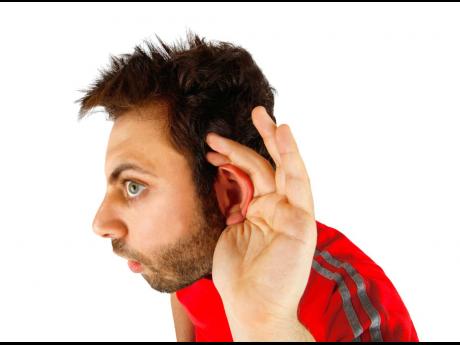Dear Doc | Is a duppy trying to talk to me?
Q I am concerned because lately, I keep hearing a ringing in my ears. It is so severe that I have to stick my finger in and shake it; and I know that it’s more than just people chatting me. Some persons have even told me that it’s a duppy trying to talk to me. However, I want to know for sure if this ringing could be caused from brain cancer. Please let me know.
A The medical term for what you are describing is tinnitus.
Tinnitus is the term doctors use when a person complains of hearing ringing, buzzing, hissing, or roaring in one or both ears. Many persons have this complaint at some point or another, and in some people it can last for months, or even years.
Yes, tinnitus can be annoying. However, it is not usually a sign of a serious problem.
Tinnitus is often caused as a result of damage to cells in the inner ear. When these cells are damaged, they send signals to the brain that make you think you are hearing things that are not really there.
Damage to the inner ear cells that result in tinnitus can be caused by:
- Normal ageing process and hearing loss.
- Exposure to very loud noise (e.g., from chainsaws, gunfire, or even loud music).
- Some medications, including some antibiotics, anti-seizure medicines, and painkillers.
- Head or neck injuries.
- Certain diseases – Stiffening of the bones in the middle ear (otosclerosis), genetic or inherited inner-ear disorders, and tumours within the auditory system.
Occasionally, tinnitus can be a result of problems not related to the hearing system, such as disorders of the jaw joint (called the temporomandibular joint), severe anxiety, and neck injuries.
Most persons who have tinnitus will hear a high-pitched, steady ringing; others will hear pulsing, rushing, or humming sounds. These sounds may sometimes become louder or softer during movement or exercise.
If you are hearing ringing, as well as other sounds that the people around you do not hear, or you are also not hearing as well as before, you should see your doctor. He or she will do an examination of your ears, and run some tests, to make sure there is nothing seriously wrong with your ears.
Hearing tests can help provide more information about the possible cause for your tinnitus. Other investigations, such as magnetic resonance imaging of the brain or computed tomography scans of the brain, may be needed, depending upon the results of the medical history and physical examination and preliminary tests done by your doctor.
There is unfortunately, no cure for tinnitus. However, there are treatments and techniques that are offered that will make it easier to live with.
Possible treatments include:
- Hearing aids – For those patients whose tinnitus is associated with hearing loss, it has been found that these persons are less bothered by their tinnitus if they get a hearing aid. A hearing aid will make outside sounds clearer and louder, which helps to make tinnitus less noticeable.
- Electrical stimulation – Electrical stimulation of certain parts of the inner ear can be accomplished by placing electrodes on the skin or using acupuncture needles. There are different modes of delivering electrical stimulation, depending on the patient’s situation and other factors, such as whether hearing loss is present.
- Acupuncture – Acupuncture involves inserting very thin, metal needles into the skin at specific points on the body. It causes little to no pain. Acupuncture may be used alone or in combination with electric stimulation.
- Herbal remedies – Combinations of herbs are often promoted as treatment. Ginkgo biloba and melatonin have both been studied for use in treating tinnitus. While some patients report benefit from these types of treatment, there are no studies which show high rates of improvement in tinnitus from herbal remedies.
- Vitamins and minerals – Vitamins and minerals that have been studied for treatment of tinnitus and inner-ear health include niacin (a B vitamin), zinc, and copper. Some patients report benefit. However, there are no studies showing high rates of improvement in tinnitus from vitamin or mineral remedies.
- Sounds that cover up tinnitus – People can sometimes cover up or mask the ringing in their ears by listening to music or other soft sounds. There is even a ‘white noise’ device that makes a sound to mask tinnitus.
- Behavioural therapies – Other treatments for tinnitus include Tinnitus retraining therapy, masking, biofeedback, and cognitive behavioural therapy.
If you have had tinnitus for a long time, it probably is not going to go away. But it will bother you less over time.
Visit your doctor to ensure there is no medical cause for your symptoms, such as a tumour.
Send your questions to outlook@gleanerjm.com.

